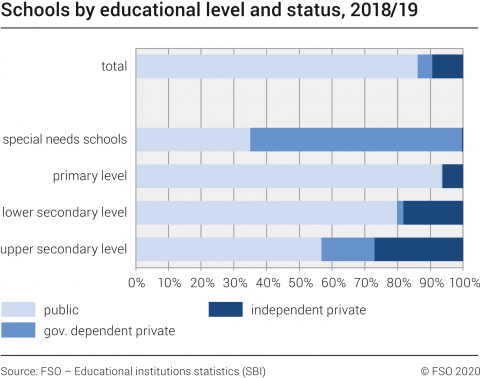School status
Most Swiss schools are state-run schools (87%). Around a third of private schools are subsidised (35%). The status of the educational institutions varies not only by educational level, but also by canton. Across all levels of education, more than half of the private schools surveyed in 2018/2019 are concentrated in four cantons (Zurich, Bern, Vaud and Geneva).

Compulsory education sector
The primary school education guaranteed by the Federal Constitution of the Swiss Confederation (Article 62(2)) can be provided by the state or by private institutions. The responsibility to regulate teaching and hence also teaching by the private sector lies with the cantons. These regulate attendance of private schools during the period of compulsory education.
In all cantons private schools must be approved and are subject to state supervision. Approval is granted if the education offered by the private school is equivalent to that at state-run schools. Approval conditions therefore include the educational objectives, the curriculum, the standards of teachers and the facilities, which must be comparable to those at state-run schools. If teaching at private schools does not meet the legal requirements, the approval may be withdrawn and privately-taught pupils can be required to move into the state school system.
In some cantons private schools are supported through public resources. Furthermore, contributions to the school fees may be paid to parents and legal guardians. The compulsory school attendance requirement can also be met through private tuition, which usually has to be approved and is subject to state supervision.
93.7% of all pupils in compulsory education (primary level, lower secondary level, including schools with a special curriculum) attended a state school in the 2018/2019 academic year.
Post-compulsory education sector
Secondary sector: upper secondary level
-
Private general education schools (baccalaureate schools and upper secondary specialised schools), with leaving examinations which are recognised by the Confederation or canton and which issue recognised certificates, must meet certain conditions: the curriculum, admission, transfer to the next grade and examination regulations must correspond to those of the state-run schools. Some important regulations such as the curriculum or examination regulations require state approval.
At private schools which are not recognised throughout Switzerland pupils are directly prepared for the Swiss baccalaureate examination. This is regulated by the Verordnung über die schweizerische Maturitätsprüfung [Ordinance on the Swiss baccalaureate examination].
- Vocational education and training (VET) in a training company usually takes place in a profit-oriented private or public manufacturing or services company. As providers of practical professional training, companies require training authorisation from the canton. Private providers of VET schools also require approval and are subject to the supervision of the cantons. Private schools with canton approval can also offer full-time VET (e.g. trade or IT schools).
In the 2018/2019 academic year 85.3% of all pupils attended a state-run general education school, while 86.3% of all learners were educated at a state-run VET or full-time school.
Tertiary sector
-
The Confederation and the cantons operate two Federal Institutes of Technology, ten cantonal universities and eight universities of applied sciences. Alongside these public-sector institutions there is currently one private university of applied sciences, as well as private university-level institutions.
In the higher education sector, the Federal Act on Funding and Coordination of the Higher Education Sector (Higher Education Act, HEdA) came into effect on 1 January 2015. With this piece of legislation, a system for mandatory institutional accreditation was introduced for all higher education institutions using the designation “university”, “university of applied sciences” or “university of teacher education”, or derived designations such as “university institute” or “university of applied sciences institute”.
All private institutions wishing to use the above designation will have to undergo the same accreditation procedure as state-run university-level institutions.
The decision-making body for institutional accreditation is the Swiss Accreditation Council. A complete list of all recognised universities in Switzerland is available on the website of the Rectors’ Conference of the Swiss Universities (www.swissuniversities.ch).
In the 2018/2019 academic year 86% of all students at universities of applied sciences (excluding universities of teacher education) attended a state-run institution.
-
In the tertiary level professional education sector, the training courses are largely under the aegis of the business sector. The professional organisations are responsible for the Federal Diploma of Higher Education and the Advanced Federal Diploma of Higher Education. Preparatory courses for the Federal Diploma of Higher Education and Advanced Federal Diploma of Higher Education are held by cantonal educational institutions, training centres, professional associations and private education providers.
The courses of education at colleges of higher education are also offered by the professional organisations, private companies or public-sector establishments/bodies.
Private providers may be subsidised by the public sector. The receipt of contributions is tied to certain conditions (quality measures, demand-oriented courses, appropriate organisation).
Continuing education and training (CET)
CET is primarily the responsibility of the individual. CET activities take place outside the formal, state-regulated education system. There is a wide range of offers. The private sector plays an important role as the maintaining bodies and providers of CET and in its funding.
The Swiss Private School Register, a foundation which is subject to supervision by the Federal Supervisory Authority of Foundations, affiliated to the Federal Department of Home Affairs (FDHA). The foundation keeps a register of Swiss private schools. The Swiss Private School Register is intended first and foremost to certify that the private schools entered in the register are ready and willing to carry out their educational duties at a high level and in accordance to contract. Private schools must meet certain criteria to be entered in this register.
In particular they must have a quality assurance system which has been tested and certified by a nationally or internationally accredited certification body.

